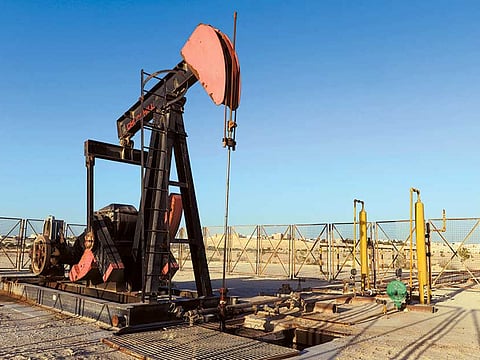GCC measures not enough to address revenue shortfall — IMF
Governments’ debt projected to increase from 13 per cent of GDP last year to about 45 per cent in 2021

Dubai: The steep drop in oil prices has led to a significant deterioration in fiscal balances of GCC countries. Despite the deficit-reduction measures adopted so far, this year’s projected budget deficits are high this year, according to the International Monetary Fund (IMF).
In a recent paper prepared by the IMF’s Middle East and Central Asia Department under the guidance of Masoud Ahmad, director of the department, the IMF warns that the fiscal consolidation measures undertaken so far fall short in addressing the magnitude of revenue shortfall from oil prices.
To the IMF estimates the GCC region and Algeria together are expected to post a fiscal deficit of 13 per cent of GDP, down from a surplus of 8 per cent in 2013, reflecting the high reliance of these budgets on oil-related revenues
The starting public debt ratios are low, and accumulated financial savings are sizeable in many — but not all — countries, pointing to significant fiscal buffers in the near term. Countries with room to borrow and ample financial savings can afford a more gradual fiscal adjustment, but all countries will need to adjust over time, given the large revenue losses from lower oil prices.
“Most GCC countries have not yet increased non-oil revenues in a meaningful way, although several policymakers have announced the introduction of a GCC-wide value added tax (VAT), as well as other fees, charges, and excises,” wrote IMF staff team led by Martin Sommer in a report, “Learning To Live With Cheaper Oil” published on Wednesday.
Although the IMF staff team has commended the GCC efforts on fiscal consolidation, they said many ambitious consolidation measures are not generally translating into better fiscal positions this year because of the further drop in oil prices.
“Fiscal deficits are projected to shrink as a percentage of GDP only in Algeria, Kazakhstan, Oman, and Saudi Arabia. The medium-term fiscal trajectory remains challenging, especially for Mena oil exporters,” the report said.
Even after incorporating the announced measures, fiscal deficits of GCC countries and Algeria are still projected to average about 7 per cent of GDP in 2021. The cumulative deficits for this country group are expected to reach almost $900 billion during 2016-21.
Gross government debt is projected to increase from 13 per cent of GDP last year to about 45 per cent of GDP in 2021. This points to a modest average debt load; however, the debt ratio for some countries is forecast to exceed 100 per cent of GDP by the end of the decade.
Over the medium term, IMF country teams expect oil exporters to continue curtailing public investment, but also to broaden spending restraint to curb the public wage bill and achieve further subsidy cuts. On the revenue side, the expected increase in oil prices would help ease the adjustment.
Sign up for the Daily Briefing
Get the latest news and updates straight to your inbox


